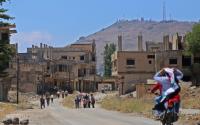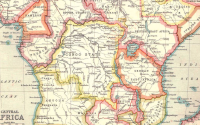Sunday March 31, 2002The Observer The appalling events in the Middle East are the predictable results of the negligence and prejudice of the Bush administration. The Passover massacre in Netanya was an abominable crime. Indeed, all suicide bombings in Israel proper are terrorist atrocities, unspeakable and also self-defeating. But while such crimes cannot be excused, they can be explained. As Israel's most influential journalist Nahum Barnea told his readers: 'The terrorism of suicide bombings was borne of despair and there is no military solution to despair.' That despair has been induced by the Israeli army killing more than 1,400 Palestinians in 18 months, Israel's continued building of illegal settlements on Palestinian land, military occupation, daily humiliation and economic suffering. When, as the Israelis have done, you make life not worth living for thousands of Palestinians, there will be no shortage of suicide bombers. The Bush administration has long known that for it to remain largely passive while the Israeli-Palestinian conflict grew steadily worse would sooner or later ensure an explosion. It also knew that Ariel Sharon has never wanted peace with the Palestinians and never will - he only wants their surrender and expulsion. As the speaker of the Knesset said a few weeks ago, Israel now has 'a violent government out to destroy the Palestinian authority to avoid giving up the settlements'. Yet because the US believed that the Israelis would eventually win the conflict, they gave Sharon a green light to be as brutal as he liked, short of killing Yasser Arafat, the Palestinian leader. And despite Sharon's record, Bush happily hobnobbed with him, while refusing to meet Arafat. If Bush and Cheney hoped that Sharon's treatment of Arafat would bring him to heel, they badly mistook their man, as I saw for myself in Ramallah a few days ago. Arafat has long thrived on adversity, of which he has known a great deal. When I met him after he had been imprisoned for months in his headquarters at Ramallah, with Israeli tanks only a few yards away, and he had been shelled and bombed, he was notably unintimidated and, though depressed by suicide bombings, surprisingly ebullient. He had no intention of sacrificing Palestinian interests or dignity simply to be given Sharon's gracious permission to attend the Arab summit in Beirut, which he knew he would not be given, or to be granted an audience with Vice President Cheney. As the peace activist and former Knesset member Uri Avnery said of Cheney: 'When an overbearing Vice President dictates humiliating terms for a meeting with Arafat he pours oil on the flames... persons who lack empathy for the suffering of the occupied people would be well advised to shut up.' Arafat, who has made some serious mistakes, was relaxed but defiant. Needing a document, he was anxious to exhibit his 'infallible filing system', which consists of bulky piles of documents in his battledress pockets. His files, as he showed us, even extend to large wads of paper in both hip pockets which, one would have thought, must be exceedingly uncomfortable. He was particularly scathing about the Israeli claim that justice for the Palestinian refugees would entail Israel being swamped by millions of Palestinians. Is it likely, he demanded, that they would want to go back to being ruled by Israel? He was convinced that the problem could be solved justly without the Jewishness of Israeli being threatened. Sharon may well kill Arafat, but he won't frighten him. As Michael Ben-Yair, Israel's attorney general between 1993 and 1996, wrote in Haaretz earlier this month: 'The intifada is the Palestinian people's war of national liberation. We enthusiastically chose to become a colonialist society, ignoring international treaties, expropriating lands, transferring settlers from Israel to the occupied territories, engaging in theft and finding justification for all these activities... we established an apartheid regime.' Israeli organisation Peace Now has spotted 34 new settlements started since Sharon became Prime Minister. When I was driving round the West Bank last week and seeing both these new settlements and the growth of the old ones, that seemed, if anything, an underestimate. Yet while Bush has constantly told Arafat to stop the Palestinian violence, which Sharon's purposeful destruction of the Palestinian infrastructure and police stations has rendered him incapable of doing under present conditions, he has made no effort to make Sharon cease all settlement activity and enter peace talks. Since even the American Secretary of State said last November that the occupation must end, it is presumably the pro-Israeli bias of the dominant members of the Bush administration which is responsible for that administration determinedly shutting its eyes to the basic fact of the Palestinian struggle - that Israel is fighting a colonial war to subjugate the Palestinians, while the Palestinians are fighting to end 35 years of occupation of their land. As Michael Lind, an Israeli journalist, puts it, Bush's 'reflections on the conflict seem to have been written by the Israeli lobby' in the US. In an illuminating article in Prospect magazine, he points out that the Israeli lobby distorts US foreign policy and makes anything more than the mildest criticism of Israeli taboo in the mainstream media. 'Until Americans have ended this corruption of our democratic process,' Lind concludes, 'our allies in Europe, Asia and the Middle East will continue to view our Middle East policy with trepidation.' Of course, that is not a new development, but the current Bush administration looks like being even more pro- Israeli than all its predecessors. Until now, President Bush has seemed more intent on securing Republican majorities in Congress in November and getting his brother re-elected as governor of Florida than on securing decency and justice in the Middle East. America's need to gain some Arab support or, at least, acquiescence to its intended attack on Iraq has necessitated some adjustment to its attitude on Palestine, but only a small and inadequate one. Much more is now needed. On Wednesday, at the insistence of Crown Prince Abdullah of Saudi Arabia, the Arab League offered its historic and long overdue vision for peace: Israeli withdrawal from the Occupied Territories in exchange for full peace with the entire Arab world. Sharon's reaction to this peace offer and to Palestinian violence has been to launch a massive assault on the Palestinian Authority's civilian institutions and effectively to declare war. The situation is so grave that an imposed solution on the basis of the Saudi peace initiative is now the only hope. One of the imposers will have to be the United States because America is the only country that can deliver Israel. The other imposer must be Europe to ensure that at last the Palestinians get a fair deal. A postscript on Arab perceptions of Britain. A Lebanese newspaper wrote during the Beirut summit that 'the British Cabinet remains set in its course to Americanise its positions in foreign policy, sounding more and more like an offshoot of Voice of America'. If we join the US in pulverising Iraq, while remaining silent as America's ally pulverises the Palestinians, the damage to Britain's interests in the entire region may take a generation to repair. · Lord Gilmour of Craigmillar is a former Secretary of State for Defence
http://www.observer.co.uk/worldview/story/0,11581,676774,00.html






